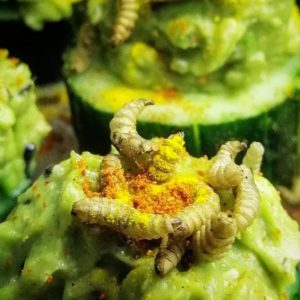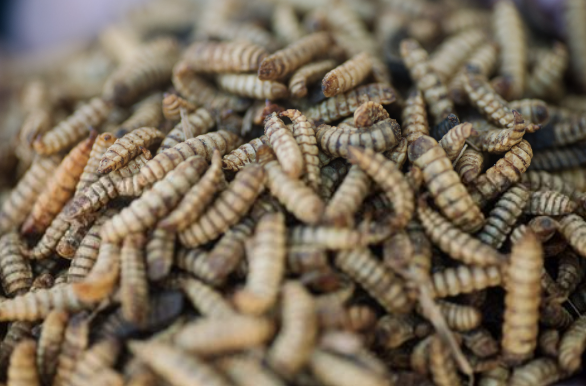I’ve been on a black soldier fly larvae kick for 6 months or so, which to those of you in the industry might make it seem like I’m late to the party. Except, I’m pushing them for HUMAN consumption. 🙂
I haven’t seen anybody else suggesting people should be consuming these larvae until recently (Ento.my in Malaysia now offers them), but I believe it’ll start to become a trend in 2020. Or at least I’m intent on making it one (followed by…cockroaches! haha).
Because yes, they’re amazing for animal feed, for pet food, for waste management, for all of these other things they’ve become famous for. But people still don’t eat them. Why not?
3 REASONS WHY BSFL ARE OVERLOOKED AS HUMAN FOOD
1) Reputation – as the sector has grown the past few years, crickets have gotten extensive media coverage as human food (and to a lesser extent, mealworms), while Black Soldier Fly Larvae have been written about as a waste management and animal feed solution. BSFL are rarely – if ever – talked about as human food. If they are, please send me a link, I haven’t seen it.
2) Regulation – Europe leads the way for regulation and most of the world looks to the EU for guidance. They’ve made it very clear that BSFL are only legal for certain animal feed applications. Not as human food. Thus, the thinking goes, “if the EU says it’s not human food, therefore it must not be”.
3) Taste – Insects tend to assume the flavor profile of whatever substrate they were fed on. When it comes to larvae eating rotten food (or worse), that’s not going to create a delicious end result. I will admit I’ve tasted some really rank larvae. There’s no coming back from that.

BSFL with dark chocolate and cashew butter makes for a delicious, crunchy cookie bite
But this year has brought about myriad new discoveries in the sector, especially as relates to soldier flies. In Asia, producers have been experimenting with cleaner inputs, and achieving higher nutritional values, faster harvest times, and yes, delicious taste!
So if they’re just as nutrient dense as crickets or mealworms, arguably more sustainable, and drastically cheaper…it seems like they should be considered as a human food solution.
I have been doing just that, and while I still prefer cricket powder to anything else, the roasted BSFL have become my go-to snack and “critter crouton” topping for just about everything.
(But I still believe that eventually, crickets will become more boutique as BSFL get commoditized for human consumption.)
This week I’ve been back in the US for a few days, and just celebrated Thanksgiving, which is a very food-centric holiday. A couple years ago, my family humored me at first with my bug-eating, but over time they’ve actually started incorporating it into their diets as well.
And they’re not the only ones. Everyone who has tried the BSFL I brought from Malaysia has gone, “wow, those are actually really good.” Because they are – they’ve got a great natural taste and a really good mouth feel texture.
The fact that they’re “grubs” does take a bit of mental fortitude to overcome, but if you can accept them as food at a basic level, from there it’s easy to enjoy them, because as a food, they’re delicious!
We included BSFL as a feature ingredient in a variety of dishes at Thanksgiving, one of which (the chocolate cashew banana bites) was a definite hit. So since everybody who tries them seems to love them, I’ll soon have BSFL products available for humans, and test my hypothesis.
Will black soldier fly larvae be accepted as a human food source? Will it sell?
Or is their reputation simply too connected with waste management for consumers – and regulators – to ever move past?

BSFL topping avocado cucumber bites
Only one way to find out, and that’s to test it! So we’re doing a limited run of insanely tasty BSFL which will be available in December, and it’ll either become a thing, or I’ll admit defeat. That’s not gonna happen though! They’re definitely people food.
If you’re in the insect industry, do you, or would you, eat grubs on a daily basis as a larger % of your diet? Why or why not?
(That’s a topic for another day, but I’m always curious about how so many people in the industry don’t seem to actually eat a lot of bugs themselves…)




